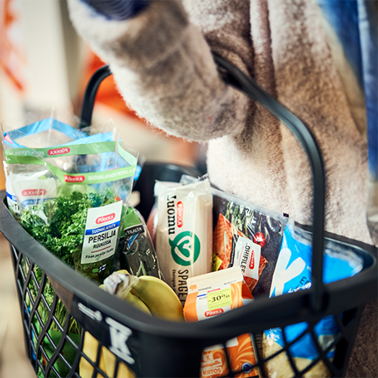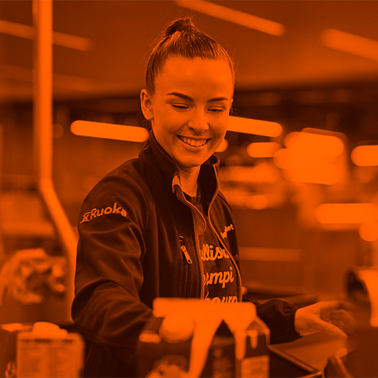Finland is lagging behind in its achievement of the EU’s targets to reduce the use of plastic carrier bags and for recycling plastic. New measures are needed and both businesses and customers must be involved. Customers are being encouraged to reduce...

Pensioners most active in bringing their own bag to the grocery store – plastic bags bought when popping in unexpectedly

According to K Group’s survey*, customers use their own bags actively when going to the grocery store. Of all respondents, 83% stated that they bring their own bag to the grocery store always or usually. The corresponding figure among pensioners was 93%.
Households already have a broad range of tote bags and other reusable grocery bags, as nearly all respondents mentioned that they have them. Bringing a reusable bag to the store is one way to reduce personal consumption of plastic bags as, according to K Group’s sales data, the plastic bag is by far the most popular option when buying a grocery bag at the store checkout.
According to the sales data, plastic bags are purchased most often by families with children. Pensioners are highly represented at the other extreme, as they purchase relatively the fewest plastic bags compared to other customer groups. The sales data also show that, regionally, the fewest shopping bags are purchased in the Åland Islands, Uusimaa and Southwest Finland, whereas they are purchased the most in Kymenlaakso and Ostrobothnia.
Plastic bags are purchased during unplanned visits to the grocery store
The most important reason for bringing a reusable bag to the grocery store varied from one respondent to the next. Many considered a reusable bag to be an environmentally friendly option (37%), while others saw its practicality as the most significant reason (31%). Roughly a quarter stated that it is important to save money by not having to buy a bag when going shopping.
Many may recall a situation where they realised at the checkout that they have forgotten their own bag at home or in their car. However, an unplanned visit to the grocery store was the most common reason for not bringing a reusable bag to the store (57%). Among pensioners, who often bring their own bag to the store, the corresponding figure was as high as 73%. Roughly a third of all respondents stated that forgetting is the most common reason for not bringing their own bag to the store.
A roll of bin bags is a more affordable choice
The three most popular reasons for selecting a plastic bag at the checkout in place of other options were the easy reusability of plastic bags, their lower price compared to a tote bag, and the habit of having always bought a plastic bag. Open-ended responses underlined that a plastic bag is selected in place of other options because it can be used as a bin bag.
This was also a popular answer to a question regarding the reuse of plastic bags: significantly the largest part of all respondents reuses plastic bags as bin bags. Recycling was emphasised in open-ended responses, including the use of plastic bags to carry empty bottles to the store and collecting plastic packaging in a plastic bag.
However, plastic bags should not be purchased only to reuse them as bin bags, as the price of a bin bag roll is lower.
“Not many perhaps think that a roll of bin bags is a more affordable option when comparing the use of a plastic bag purchased at the checkout as a bin bag and bags intended for the purpose. Bin bags sold in rolls are made of thinner plastic, and their unit price is only a third of that of plastic bags sold at the checkout,” says Sirpa Koppinen-Lindström, Purchasing and Sales Director at Kesko.
Customers support the reduced consumption of plastic bags
K Group is committed to the plastic bag agreement between the Finnish Commerce Federation and the Ministry of the Environment to reduce the consumption of plastic bags in Finland.
Most respondents to the survey had a positive approach to the goal, and a significant majority saw that everyone is responsible for reducing the consumption of plastic bags. Almost half of all respondents stated that they will reduce the use of plastic bags in their daily activities (48%). In contrast, many stated that they have already reduced their use enough (43%).
The goal set in the agreement is that no more than 40 plastic bags per person per year would be consumed in Finland by the end of 2025.
“I’m glad that many of our customers want to join us in reducing the use of plastic bags, as we can only achieve this goal by working together. I’d like to encourage everyone to use a single bag many times, whether they are using a tote bag or another option. Even though a large part of plastic bags already end up in waste management services, we hope that achieving this goal will reduce the amount of littering caused by plastic bags and the resulting adverse impact on nature,” says Timo Jäske, Sustainability Director at Kesko’s grocery trade.
*Survey conducted for the K-Kylä customer community in February 2024. The survey had 705 respondents.
 YES
YES
 NO
NO












